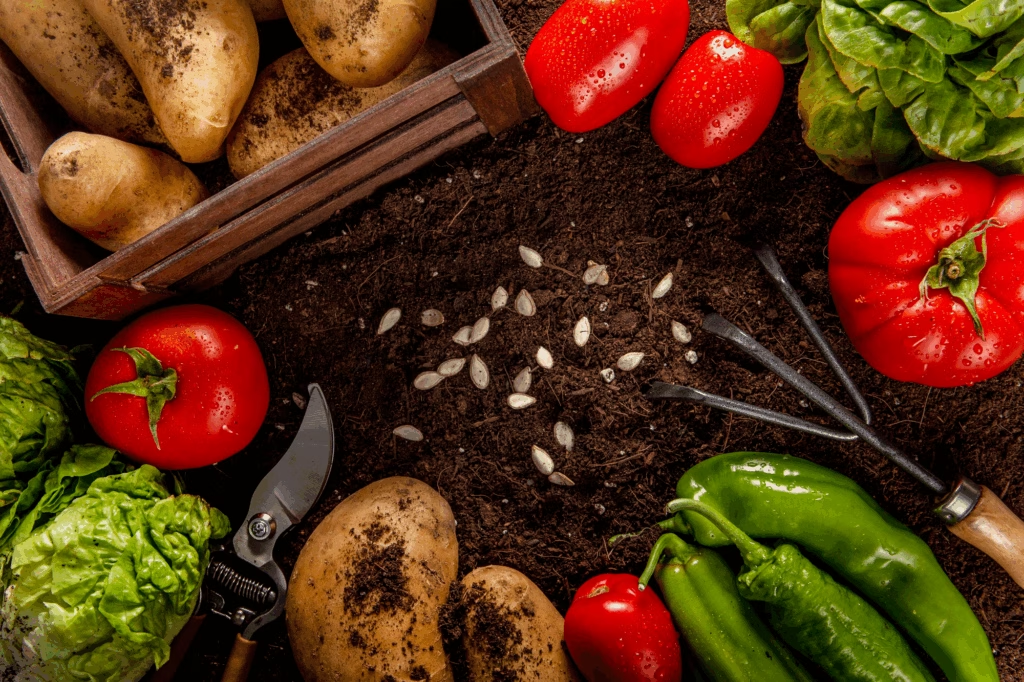The foundation of a thriving garden lies in selecting the right vegetable seeds. Whether you’re a home gardener or a commercial farmer, seeds determine the yield, quality, and taste of your vegetables. With so many options available—hybrid vegetable seeds, organic vegetable seeds, and traditional seeds of vegetables—choosing the best can feel overwhelming.

In this guide, we’ll explain the types of vegetable seeds, their benefits, and how you can buy the best seeds for your garden or farm.
What Are Vegetable Seeds?
Seeds of vegetables are tiny living units that carry the genetic material to grow into a vegetable plant. The quality of the seed influences the plant’s germination rate, resistance to diseases, and final harvest.
Broadly, vegetable seeds are categorized into:
- Hybrid Vegetable Seeds
- Organic Vegetable Seeds
- Open-Pollinated Seeds (Traditional)
Understanding these categories will help you make the right choice for your garden.
Hybrid Vegetable Seeds
What Are Hybrid Seeds?
Hybrid vegetable seeds are produced by cross-pollinating two carefully selected parent plants with desirable traits. For example, one plant may have resistance to disease while another may yield larger fruits. The resulting hybrid seed combines both qualities.
Benefits of Hybrid Vegetable Seeds
- Higher yield compared to traditional seeds
- Better disease resistance
- Uniform size, shape, and color of vegetables
- Faster growth and adaptability to climate conditions
Limitations of Hybrid Seeds
- Seeds cannot be saved for the next season (as they won’t grow true-to-type)
- Slightly more expensive than traditional or organic seeds
Example: Hybrid tomato seeds produce uniform, high-yielding tomatoes that resist common plant diseases.
For more on seed technology, visit the Food and Agriculture Organization (FAO).
Organic Vegetable Seeds
What Are Organic Seeds?
Organic vegetable seeds come from plants grown without chemical fertilizers, pesticides, or genetic modification. They are cultivated under certified organic farming conditions.
Benefits of Organic Vegetable Seeds
- Chemical-free and safe for health
- Environmentally friendly farming practice
- Suitable for organic certification in farms
- Seeds can often be saved and replanted
Limitations of Organic Seeds
- May yield less than hybrid seeds
- Require natural pest management techniques
Example: Organic spinach seeds produce fresh, chemical-free leaves ideal for home gardens.
Check certified organic standards from the USDA Organic Certification.
Traditional / Open-Pollinated Seeds of Vegetables
Open-pollinated seeds of vegetables are naturally pollinated by insects, wind, or birds. These seeds are the most sustainable because they can be saved and replanted year after year.
- Pros: Cheaper, natural, great for biodiversity.
- Cons: Less uniformity and sometimes lower yields than hybrid seeds.
How to Choose the Best Vegetable Seeds for Your Garden
When selecting vegetable seeds, consider:
- Climate & Region – Choose seeds suited to your area’s weather.
- Space Available – Balcony gardens may need compact plant varieties.
- Purpose – For higher yield, go with hybrids; for sustainability, choose organic or open-pollinated.
- Budget – Hybrid vegetable seeds are costlier, while traditional ones are budget-friendly.
Explore quality seed options at Agzora – Gardening Seeds Collection.
Popular Vegetable Seeds in India
Here are some widely grown seeds of vegetables for Indian home gardens and farms:
- Tomato Seeds (Hybrid & Organic)
- Spinach Seeds
- Onion Seeds
- Cucumber Seeds
- Carrot Seeds
- Cabbage & Cauliflower Seeds
- Okra (Ladyfinger) Seeds
Each vegetable has both hybrid and organic options depending on your farming goals.
Buying Vegetable Seeds Online
With e-commerce platforms, it’s easy to purchase vegetable seeds online. Benefits include:
- Variety – Access to hundreds of vegetable seed types.
- Convenience – Delivered to your doorstep.
- Reviews & Ratings – Helps select the best seeds.
- Discounts & Combos – Affordable for home gardeners.
Trusted places to buy:
- Agzora Gardening Store (for curated, affordable packs)
- Amazon India – Vegetable Seeds Section
- ICAR (Indian Council of Agricultural Research) for farmers
You can also check the National Horticulture Board for resources on seed quality and standards.
Tips for Growing Vegetables from Seeds
- Prepare Soil Well – Use organic compost and ensure proper drainage.
- Check Seed Depth – Different seeds require different planting depths.
- Water Consistently – Avoid overwatering to prevent rotting.
- Provide Sunlight – Most vegetables need 5–6 hours of sun daily.
- Protect Seedlings – Use nets or covers to protect from pests.
FAQs on Vegetable Seeds
Q1. What is the difference between hybrid vegetable seeds and organic seeds?
Hybrid seeds are bred for yield and disease resistance, while organic seeds are grown without chemicals and are eco-friendly.
Q2. Can I save seeds from hybrid vegetables?
No, hybrid seeds won’t produce the same quality in the next season. Use open-pollinated or organic seeds for seed saving.
Q3. Which are the best vegetable seeds for beginners?
Tomato, spinach, lettuce, cucumber, and chili seeds are great for new gardeners.
Q4. Where can I buy organic vegetable seeds online in India?
You can buy from Agzora.com, Amazon, and certified organic seed suppliers.
Q5. Do vegetable seeds expire?
Yes, most vegetable seeds are viable for 1–3 years if stored properly in cool, dry conditions.
Conclusion
Choosing the right vegetable seeds is the first step toward successful gardening or farming. Hybrid vegetable seeds are great for yield and disease resistance, organic vegetable seeds support health and sustainability, while traditional seeds of vegetables are perfect for natural gardening and seed saving.
With the rise of online shopping, it’s now easier to buy high-quality vegetable seeds online from trusted platforms. Whether you want a kitchen garden or a small farm, selecting the right seeds ensures a rewarding harvest.





